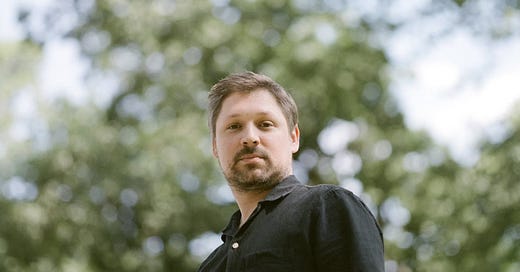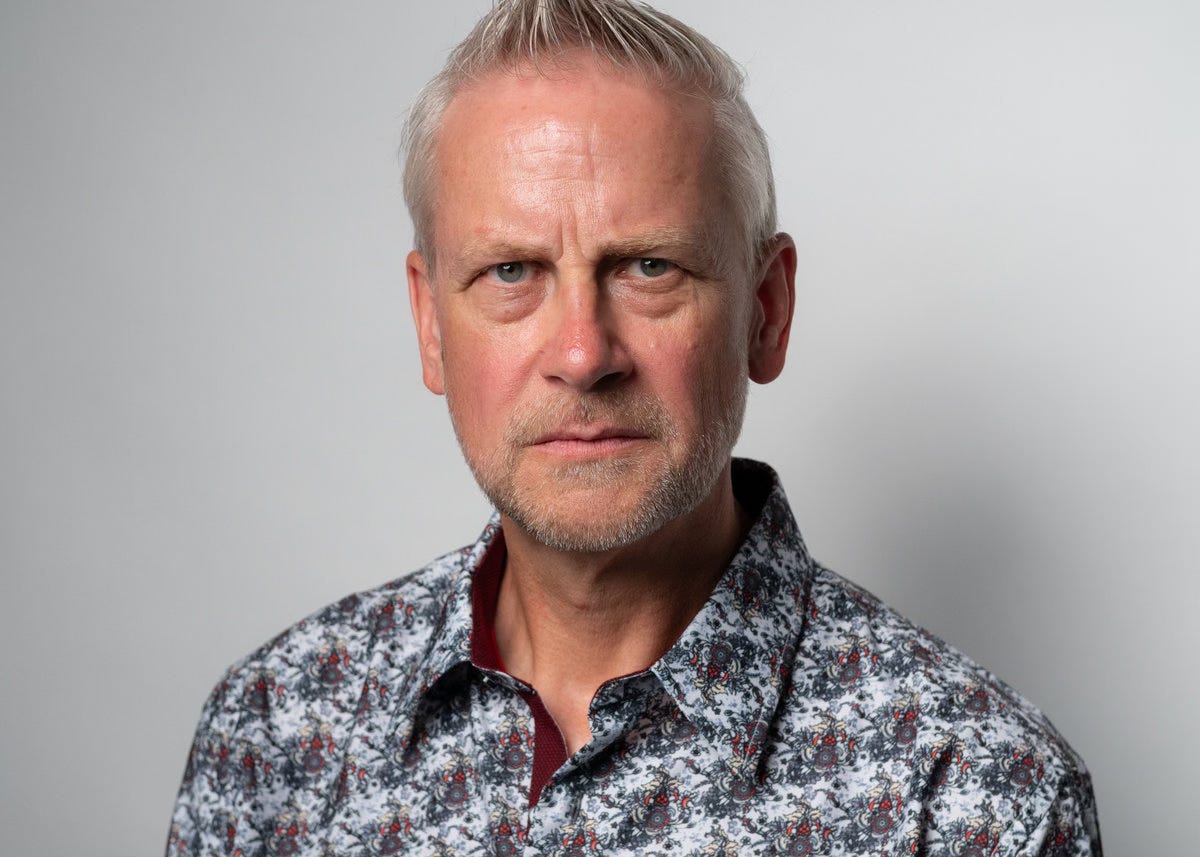Albums discussed this week:
Unfolding · Paul Bedal, piano, compositions, with Matt Ulery, bass, and Quin Kirchner, drums
Reveal · Russ Johnson, trumpet, compositions, with Mark Feldman, violin; Ethan Philion, bass, and Tim Daisy, drums; note: this band performs at the Hungry Brain Sunday, January 7, at 9 pm
When I was a visiting professor of English for three years at Wake Forest University in North Carolina in the early aughts, I made my way gradually into the good graces of the music department, such that by the third year I had a key to some of the best practice rooms in the music building, which was just a short walk from my faculty apartment. I got into the habit of going there every night, after dinner, until I was exhausted and ready to sleep. I wouldn’t call it practicing really—it was just playing: exploring what the piano could do, exploring freewheeling shapes of sound and emotion. I was trying to get out of the way. Sometimes I played with the lights off. I remember a particularly urgent period of playing after my father died—that was within just a few months of arriving there, and I was especially inspired by someone’s rendition of a Bach Partita. So obviously that was about grief, but a lot of the other time, I still found this a powerful way to develop something in me, even if I wasn’t sure what it was.
I also remember a few times when I have played my heart out in circumstances like that—alone, as I thought—only to learn later that someone heard me and appreciated what they heard (and of course, I’ve had the nearly opposite experience too, of being shushed, or asked not to play—that did not happen, thankfully, in the music building practice rooms). There is something simple but potent here. I think one of the things I’m after when I perform is to get to the level of freedom and abandon that I can achieve alone, late at night, when my conscious direction is fading and when I don’t have to worry about anyone’s judgments. And it can happen with groups too, of course, which then becomes that much more magical—see my earlier “twin talk” article, for example.
It seems parallel to something I claimed to my class recently about a certain thread of current pop star—that their job was finding the most private and confidential truths that we might utter, or really, fail to utter, be unable or unwilling to utter—and speak them on stage and on record. Is music just an accidental vehicle for this? Just an exceedingly odd feature of humanity that for us, music makes such otherwise-impossible utterance possible? Maybe. Note: Maybe it’s production too: Phoebe Bridgers’ accompaniments on Punisher are both extremely quiet, muted, and also clear and precise, and allow her to sing just above a whisper while everything still speaks and coheres. I was feeling a similar vibe with Billie Eilish’s song for the end of the Barbie movie, “What Was I Made For?” and that made me think that this is a larger thread of popular music now.
Some of the conventions that surround jazz seem to promote this kind of intimacy, confidentiality. There is generally less reverb in jazz recordings, giving the impression that they are in a smaller space. There is, at least with piano jazz, a tradition of pianos being, shall we say, rather ordinary. Not the best pianos money can buy, expertly tuned and beautifully miked—no, more like, decent, mostly in tune, acceptable. I have come to appreciate this as un-fussiness, and lack of pretense, and also a sign of the flexibility of jazz pianists to work with the hand they are dealt, spin gold from dross etc.
When I talked to Paul Bedal about his recent piano trio release, Unfolding, and my particular affection for the last track, “Bending with the Night,” he told me the story of how he wrote it, on an evening in his new apartment in Brooklyn, on the upright piano he had recently acquired, with a beer, and just an inclination to listen to what was out there.
Something of that mood of friendly informality makes it onto this—also multi-layered, deeply accomplished—record. It helps, I think, that the three musicians know each other well, have performed for years together, are familiar with each other’s composing languages, and with the vocabulary of the Chicago scene. After trying out versions of these compositions at different venues, Bedal worked out a date to record at a location familiar to all three, where they could set up without much fuss, and a few hours later—it was done.
Listen to “Bending with the Night,” and then maybe (also night-related) “Luna Hermosa,” a piece inspired by some Brazilian choro musicians Bedal spent time with on a recent Thanksgiving. Listen to Matt Ulery’s beautiful bass solo riffing on the melody there. Then maybe move on to “Life on Ocean,” a composition that I noted had an appealing mix of rapidly-evolving, harmonically dense but melodically-driven sections, and open zones, then working its way to a “meeting point”—where everyone plays the same rhythms briefly. When I was jabbering on about how much I liked this material he mentioned that when he’d put this in front of some NY players one had pointed out that the first of these meeting points is almost a quote of none other than Toto’s “Africa.” It’s a distant quote all right! But one that Bedal had no problem with, once he realized it, since he has nothing but respect for the song.
“April” is a solo piano piece, again, in his new apartment, with his wife, in a new city, getting through the pandemic. It is a place that especially shows him off as a pianist who has spent plenty of time with classical repertoire. I heard Debussy here and he affirmed that and also mentioned Ravel’s Tombeau de Couperin.
A composition for which the appropriate adjective to me for some reason seems to be “decisive,” is “Outside the Wake.” Bedal suggested that this was more in the territory of his film score writing. Its rhythms evoke Brubeck’s “Blue Rondo” for me, and it ends up giving up some of its initial decisiveness to loosen things up and have the group improvise, before eventually returning to the “outside” where we began.
Reveal
One way I could tell how different things were with Russ Johnson’s record was how our cats reacted (not jazz cats; actual cats) when I put it on our stereo: they sat up, they trained their ears, they made ready for—something that required attention.
If Bedal’s Unfolding displays the deep comfort of musicians who know and trust each other, and who come together to document a moment in a long musical friendship, Johnson’s record is much more about putting together a new configuration to make sparks fly, and providing just enough structure to support the meeting. Especially interesting to me was the fact that bassist Ethan Philion and drummer Tim Daisy had not played together prior to this band, and were perceived to some extent as on different sides of the spectrum of “free” or “open” playing, and more “straight ahead” playing. There’s no evidence of any trouble caused by this—quite the opposite, as the rhythm section seems totally at ease both in free improvisation and hard-charging grooves, and everything in between. Daisy is musician of immense experience and particular association with Johnson (and has recently released a duo recording with Feldman). Philion has a richly deserved reputation as one of the most technically adept, musical, and adventurous bassists to arrive on the scene in Chicago in recent years. (I’ll write about his first releases as leader soon, built around the music of Charles Mingus, and his original compositions with a quartet that also features Russ Johnson, both on Sunnyside Records.)
The start of the opening track—“Skips”—strikes a note of melancholy, evoking for me the scores Andrew Dickson wrote for Mike Leigh movies in the 80s and 90s. At least until things start grooving, at which point the resemblance disappears. But the opening also sets up the individuality of the instruments’ voices. I’m in love with the kind of writing for a group (or mix of writing and improvisational direction or provocation) that displaces traditional roles as this does. For a while the violin is playing the bass line—not in the bass clef, because that isn’t possible, but the role. The trumpet plays long lyrical lines, and the bass makes rapid comments that only tangentially ground things. Then Feldman and Johnson engage in a dazzling call-and-response that blurs into joint improvisation. Then they unify, and then we arrive at a splendidly funky groove in 7.
“The Slow Reveal” begins with sound effects from every instrument—and sometimes it can be hard to tell whether the bass or violin is the one making the sound—especially since it seems as though Philion has assimilated and can play himself some of the more idiosyncratic effects from Feldman’s collection of musical language built on extended technique (e.g., flurries of ultra-high-register artificial harmonics) or regular techniques, extended (i.e., cross-bowed arpeggios, playing the s— out of scales). I think I’m hearing at moments Philion using his exquisitely in-tune bowing to extend with double-stops downward the uncanny arpeggios that Feldman seems to be able to deploy in any harmonic situation. That happens about five minutes into this track.
The reveal is satisfying indeed, and builds to a fearsome intensity, and more layers of sound and energy keep getting added. This is serious music. The Mike Leigh connection in my mind seems right emotionally: this is a composer and a band with stories to tell that are important and weighty, and the mood is not particularly comforting or gemütlich. The notes included on Bandcamp highlight the gorgeous “Coda” ending track, which is pleasing to compare with Bedal’s “Bending with the Night.” The mood of “Coda” is elegiac at the start, with lyrical bowing from Feldman and Philion, and understated phrases from Johnson and the lightest of malleted cymbal work from Daisy. Then the piece assembles itself into a slow march, funereal, and Feldman plays astonishing comments from the upper reaches of his instrument, and the band then falls into somewhat more pedestrian colloquy before returning gradually to silence.
I think that both of these records are deeply welcoming and—well you should have a great time listening to them. But—everything in jazz, almost always, is more immediately understandable live. So if you find yourself in Chicagoland this weekend, make your way over to the Brain to catch Johnson’s quartet if you possibly can (Bedal’s trio had an album release show earlier in December). I heard Johnson with this group on their first concert, in Madison: they played to a warm, packed house (the North Street Cabaret) and the audience hung on every move, every gesture. No explanation required.
Russ Johnson’s quartet plays Sunday, January 7, at 9 pm at the Hungry Brain, in a double-bill with the wonderful saxophonist, Max Bessesen. Tickets are $10, available in advance here.





